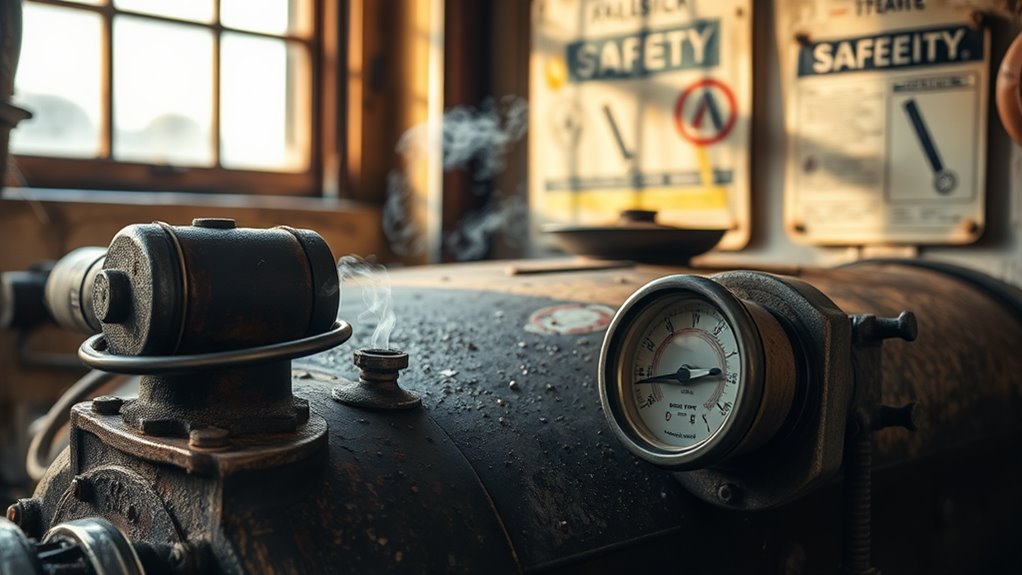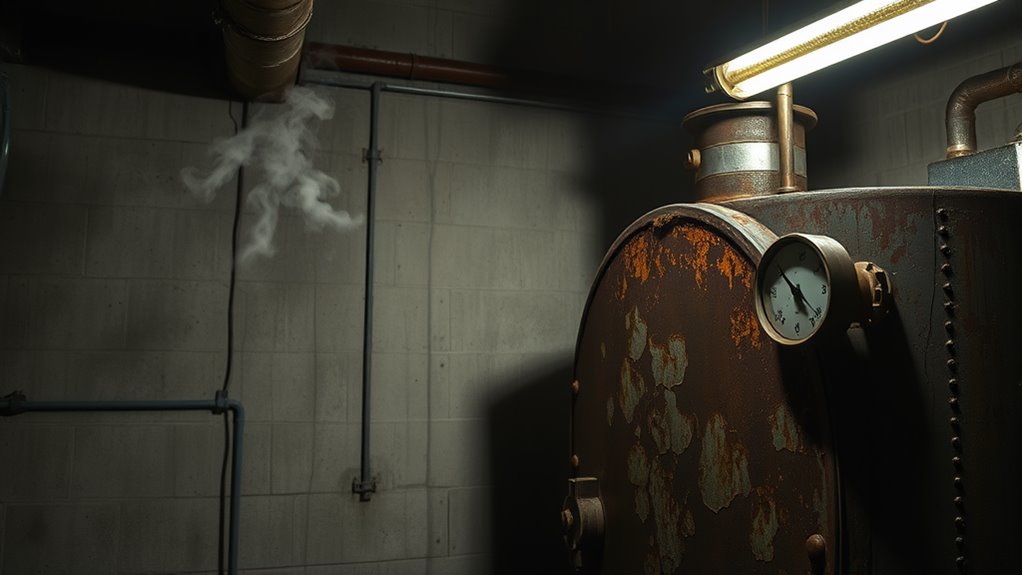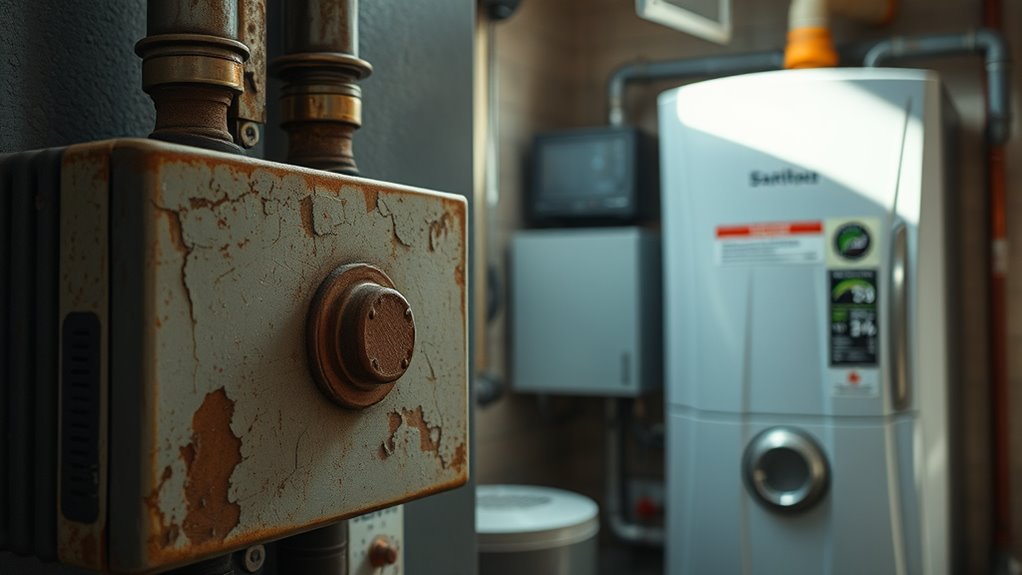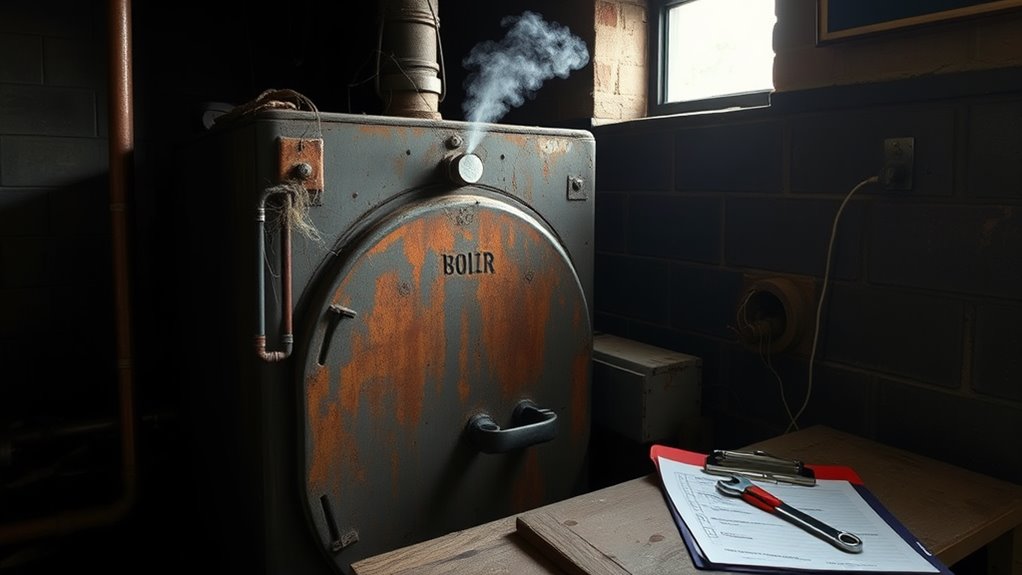A 40-year-old boiler is likely not safe. Aging boilers face significant risks like corrosion and pressure issues, which can lead to catastrophic failures. They often struggle to meet current energy efficiency standards, resulting in higher operational costs. Additionally, internal wear can cause leaks and malfunctions. Regular inspections are vital, but with age, the risks increase. If you're concerned about safety and efficiency, you might want to explore the benefits of upgrading your heating system.
Key insights
- A 40-year-old boiler may not meet current energy standards, affecting efficiency and safety.
- Aging boilers are prone to corrosion, which can lead to leaks and structural failures.
- Unusual noises or pressure issues in older boilers indicate potential safety risks that require immediate attention.
- Regular inspections are crucial; however, older boilers can still pose risks even with maintenance.
- Consider replacing a boiler over 15-20 years old to ensure safety and operational reliability.
Understanding the Lifespan of Boilers

While many factors influence the lifespan of a boiler, understanding these elements can help you determine its reliability and safety. Boiler technology has evolved considerably over the years, affecting both performance and heating efficiency. Modern boilers often feature advanced controls and materials that enhance durability, while older units may struggle to meet today's energy standards. Regular maintenance, including inspections and tune-ups, can extend a boiler's life, but be aware that parts wear out over time. Additionally, the type of fuel used and the boiler's operational environment play essential roles in determining longevity. By evaluating these factors, you can better assess whether your aging boiler is still a reliable source of heat for your home or if it's time for an upgrade. Regular servicing is crucial for ensuring safe and efficient operation, especially for older boilers.
Common Risks Associated With Aging Boilers

As your boiler ages, it becomes increasingly susceptible to various risks that can compromise safety and efficiency. One major concern is boiler corrosion, which occurs as the internal metal surfaces deteriorate over time, leading to leaks and structural failures. This corrosion can be exacerbated by the presence of contaminants in the water supply, making regular maintenance essential. Additionally, pressure issues may arise as components wear out or become obstructed, potentially causing dangerous pressure buildup. If not addressed, these pressure fluctuations can result in malfunctions or even catastrophic failures. It's important to monitor your boiler closely as it ages, ensuring regular inspections and prompt repairs to mitigate these risks and maintain peak performance. Regular maintenance protects investments in equipment, keeping your boiler in optimal condition and reducing the likelihood of unexpected failures.
Signs Your Boiler Needs to Be Replaced

Recognizing when your boiler needs replacement is essential, especially as it ages and shows signs of deterioration. First, monitor its boiler efficiency; if you notice a significant drop in heating output, it's a clear indicator of potential failure. Unusual noises, like banging or clanging, can also signal internal issues that may warrant replacement. Additionally, check for leaks around the unit; persistent moisture can indicate corrosion or other serious problems. If your energy bills rise unexpectedly, it might mean your boiler's operating efficiency is compromised. Finally, if your boiler exceeds 15-20 years, consider these replacement indicators seriously, as older models often struggle to meet modern efficiency standards. Don't ignore these signs; your comfort and safety depend on it. Regular maintenance is critical for optimal boiler performance and can help extend the lifespan of your heating system.
Benefits of Upgrading to a New Boiler

Upgrading to a new boiler can significantly enhance your home's heating efficiency and safety. With modern technology, these new systems are designed to maximize energy efficiency, resulting in lower utility bills and a reduced carbon footprint. Here are some key benefits to take into account:
- Improved Energy Efficiency: New boilers operate at higher efficiency ratings, often 90% or more.
- Advanced Safety Features: Modern models include safety mechanisms that minimize risks of leaks or malfunctions.
- Lower Maintenance Needs: New systems typically require less frequent and less costly repairs.
- Enhanced Comfort: Upgraded boilers provide consistent heating, eliminating cold spots and increasing overall comfort.
Additionally, investing in a new boiler can contribute to lower operational costs, making it a financially sound decision in the long run.
Investing in a new boiler means investing in long-term savings and safety for your home.
Tips for Maintaining Your Heating System

Maintaining your heating system is essential for guaranteeing its efficiency and longevity, especially as it ages. Start with regular boiler cleaning, which removes soot and debris that can hinder performance. Aim to clean the boiler at least once a year to enhance efficiency. Additionally, schedule safety inspections annually with a qualified technician. These inspections check for leaks, pressure issues, and guarantee all safety mechanisms function properly. Replace filters regularly to maintain air quality and system performance. Monitor the pressure gauge and listen for unusual noises, as these can indicate issues. Finally, consider keeping a log of maintenance activities to track performance trends and identify when servicing is needed. By staying proactive, you'll keep your heating system safe and reliable. Regular inspections are also crucial for ensuring legal compliance and safety, protecting your business from potential risks.
Frequently Asked Questions
Can a 40-Year-Old Boiler Still Be Energy Efficient?
A 40-year-old boiler can struggle with energy efficiency compared to modern models. Over time, older systems may lose efficiency due to wear and tear. If you prioritize boiler maintenance, however, you might improve its performance. Regular servicing can identify issues like leaks or corrosion, which affect efficiency. Upgrading components or even retrofitting can enhance energy savings, but it's crucial to weigh these options against the cost of a new, energy-efficient boiler.
What Is the Average Repair Cost for an Old Boiler?
The average repair cost for an old boiler can vary considerably, often ranging from $200 to $1,500, depending on the issue. You should consider repair frequency, as older units may require more frequent service, increasing overall maintenance costs. Regular maintenance can help mitigate these expenses, but be prepared for potential larger repairs as components age. Investing in a newer model might ultimately save you money in the long run due to improved efficiency and lower repair needs.
How Does Age Affect a Boiler's Warranty?
Age considerably impacts a boiler's warranty, often leading to warranty limitations. Most manufacturers provide limited coverage that diminishes as the boiler ages. If you're not maintaining it according to specific requirements, you could void the warranty altogether. Regular maintenance guarantees peak performance and may extend warranty benefits, but once a boiler reaches a certain age, you might face increased repair costs and reduced support from the manufacturer should issues arise.
Are There Specific Regulations for Old Boilers?
Yes, there are specific regulations for old boilers that you need to take into account. These boiler regulations often mandate adherence to updated safety standards, guaranteeing that even older models meet certain operational criteria. You should check local codes and ordinances, as they can vary by region. Regular inspections and maintenance can help guarantee compliance, and staying informed about any changes in regulations will keep your boiler functioning safely and efficiently.
Can I Sell My House With an Old Boiler?
Yes, you can sell your house with an old boiler, but it's wise to get a boiler inspection first. Potential buyers may want assurance about the boiler's condition. If it meets safety standards, you can proceed with the sale confidently. However, if issues arise during the inspection, you might need to address them or adjust your asking price to attract buyers. Transparency about the boiler's condition can facilitate a smoother home selling process.
Summary
In summary, a 40-year-old boiler poses significant safety risks and inefficiencies. If you notice signs like unusual noises, inconsistent heating, or increased energy bills, it's essential to evaluate replacement. Upgrading to a modern boiler not only enhances safety but also improves energy efficiency and reduces long-term costs. Regular maintenance can extend your boiler's lifespan, but relying on outdated technology may compromise your home's safety. Don't hesitate to consult a professional for an assessment and potential upgrade.

